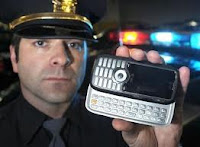Amendment IV – United States Constitution
The right of the people to be secure in their persons, houses, papers, and effects, against unreasonable searches and seizures, shall not be violated, and no Warrants shall issue, but upon probable cause, supported by Oath or affirmation, and particularly describing the place to be searched, and the persons or things to be seized.
DALLAS (CBSDFW.COM) – Think about all the personal information we keep in our cell phones: It’s something to consider after the U.S. Court of Appeals for the 7th Circuit ruled it is now legal for police to search cell phones without a warrant.
The decision stems from an Indiana case where police arrested a man for dealing drugs. An officer searched the suspect’s cell phone without warrant.
The U.S. Court of Appeal for the 7th Circuit rejected that argument, finding that the invasion of privacy was so slight that the police's actions did not violate the Fourth Amendment's ban on unreasonable searches.
"Lurking behind this issue is the question whether and when a laptop or desktop computer, tablet, or other type of computer (whether called a 'computer' or not) can be searched without a warrant," Judge Richard Posner wrote for the three-judge panel.
He raised the example of the iCam, which allows someone to use a phone to connect to a home-computer web camera, enabling someone to search a house interior remotely.
"At the touch of a button, a cell phone search becomes a house search," he wrote.
Posner compared the cell phone to a diary. Just as police are entitled to open a pocket diary to copy an owner's address, they should be able to turn on a cell phone to learn its number, he wrote. But just as they're forbidden from examining love letters tucked between the pages of an address book, so are they forbidden from exploring letters in the files of a phone.
The judge in the appeal case, Judge Richard Posner, agreed that the officer had to search the phone immediately or risk losing valuable evidence. Judge Posner ruled it was a matter of urgency, arguing it was possible for an accomplice to wipe the phone clean using a computer or other remote device.
Paul Coggins is the former U.S. Attorney for the Northern District of Texas. Coggins says the court’s ruling pushes the envelope on privacy issues and wonders if it opens the door to more extensive searches down the road. “Does that mean officers now have the right to search through your phone, search through your search history, your photographs, your e-mails and the rest, because it could all be wiped clean,” Coggins asked.
Many critics are asking the same question. They call the ruling an invasion of privacy that far outweighs the needs of law enforcement.
Both Defenbaugh and Coggins agree that the case is likely to go to the U.S. Supreme court.

No comments:
Post a Comment